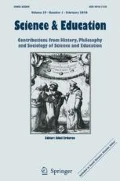Abstract
This paper is a programmatic sketch of a line of theoretical investigation in the philosophy of science education. The basic idea is that philosophical hermeneutics is an appropriate framework for science education in most of its aspects. A brief discussion is given of hermeneutics in general, of the version of it developed by H. G. Gadamer, and of the reasons for its relevance to science and to the problem of meaning in science education. A key element in this approach is the suggestion that each science be biewed as a language. Arguments against the appropriateness of hermeneutics to natural science are also discussed. One application of the theory to ongoing educational research — ‘misconceptions’ — is specifically treated.
References
Apel, K. O.: 1973, ‘Scientistics, Hermeneutics, Critique of Ideology: An Outline of a Theory of Science from an Epistemological-Anthropological Point of View’, in The Hermeneutic Reader, pp. 320–345. See Mueller-Vollmer (1988).
ArbibM. A. & HesseM. B.: 1986, The Construction of Reality, Cambridge Univ. Press, Cambridge.
AusbelD. P.: 1963, The Psychology of Meaningful Verbal Learning, Grune and Stratton, New York.
BernsteinR. J.: 1985, Beyond Objectivism & Relativism, Univ. of Pennsylvania Press, Philadelphia.
ChampagneA. B., LeopoldE. K. & AndersonJ. H.: 1980, ‘Factors Influencing the Learning of Classical Mechanics’, Amer. J. Physics 48, 1047–1079.
DuhemP.: 1954 [1914], The Aim and Structure of Physical Theory, (tr. P.P. Wiener from the 2nd ed. in French), Princeton Univ. Press, New York.
GadamerH. G.: 1975 [1960], Truth and Method, (Tr. G. Barden & J. Cumming from the 2nd [1965] ed.), Crossroads, New York.
——: 1976 [1966], Philosophical Hermeneutics, Univ. of Calif. Press, Berkeley.
Habermas, J.: 1988 [1971], ‘On Hermeneutics' Claim to Universality’, in, The Hermeneutic Reader, pp. 294–319. See Mueller-Vollmer (1988).
HansonN. R.: 1965, Patterns of Discovery, Cambridge Univ. Press Cambridge.
HeelanP. A.: 1983, Space Perception and the Philosophy of Science, Univ. of California Press, Berkeley.
--: 1988, ‘A Heideggerian Meditation on Science and Art’ in Hermeneutic Phenomenology, 0713 0909 V 2 pp. 257–75. See Kockelmans (1988).
HeideggerM.: 1962 [1926], Being and Time, (tr. J. Macquarrie & E. Robinson), Harper & Row, New York
HergetD. E. (ed.): 1989, The History and Philosohy of Science in Science Teaching (Proceedings of the First International Confrence) Science Education and Department of Philosophy, Florida State University, Tellahassee, Florida.
HesseM. B.: 1980, Revolutions and Reconstructions in the Philosophy of Science, Harvester Press, Brighton, Sussex.
KockelmansJ. J.: 1988, Hermeneutic Phenomenology: lectures and Essays, University Press of America, Washington, D.C.
KuhnT.: 1970, The Structure of Scientific Revolutions, Univ. of, Chicago Press, Chicago, Second ed.
LaudanL.: 1977, Progress and its Problems, Univ. of California Press, Berkeley.
Mestre, J. P.: 1991, ‘Learning and Instruction in Pre-College Physical Science’, Physics Today, September, 56–62.
Mueller-VollmerK. (ed.): 1988, The Hermeneutic Reader, Continuum, New York.
NovakJ. D.: 1977, A Theory of Education, Cornell Univ. Press, Ithaca, N.Y.
--: 1987, Proceedings, of the Second International Seminar: Misconceptions and 0713 0909 V 2 Educational Strategies in Science and Mathematics, June 26–29, 1987, Cornell University, Ithaca, NY.
PolanyiM.: 1958, Personal Knowledge, Routledge & Kegan Paul, London.
——: 1969, Knowing and Being, (ed. Marjorie Grene), Univ. of Chicago Press, Chicago.
Schick, J. M., Driscoll, S. E. & Carter, C. S.: 1989, ‘Problem solving and Construction of Scientific Knowledge: A Case Study in Epistemology’, in History and Philosophy of Science in Science Teaching, pp. 322–31. See Herget (1989).
Thompson M., and de Zengotita, T.: 1989, ‘Science Literacy and the Language Game of Science’ in History and philosophy of Science in Science Teaching, pp. 344–57. See Herget (1989).
VonGlasersfeldE.: 1989, ‘Cognition, Construction of Knowledge, and Teaching’, Synthese 80, 121–140.
WeinbergS.: 1979, The First Three Minutes, Bantam, New York.
WestfallR. S.: 1980, Never at Rest: A Biography of Isaak Newton, Cambridge Univ. Press, London.
Author information
Authors and Affiliations
Rights and permissions
About this article
Cite this article
Eger, M. Hermeneutics and science education: An introduction. Sci Educ 1, 337–348 (1992). https://doi.org/10.1007/BF00430961
Issue Date:
DOI: https://doi.org/10.1007/BF00430961

